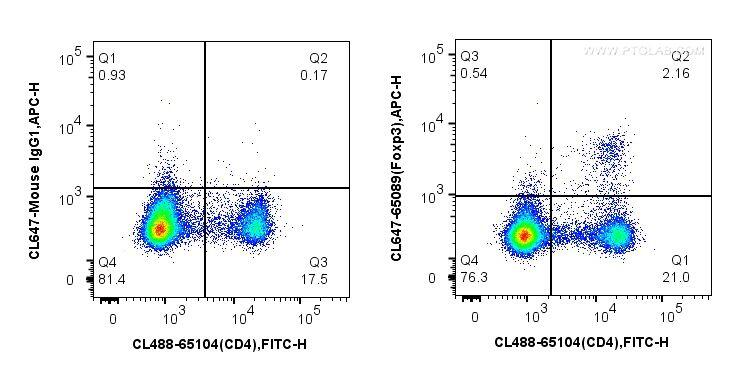- Featured Product
- KD/KO Validated
CoraLite®594-conjugated IFITM2 Polyclonal antibody
IFITM2 Polyclonal Antibody for
Host / Isotype
Rabbit / IgG
Reactivity
human
Applications
Conjugate
CoraLite®594 Fluorescent Dye
Cat no : CL594-12769
Synonyms
Validation Data Gallery
Product Information
CL594-12769 targets IFITM2 in applications and shows reactivity with human samples.
| Tested Reactivity | human |
| Host / Isotype | Rabbit / IgG |
| Class | Polyclonal |
| Type | Antibody |
| Immunogen | IFITM2 fusion protein Ag3451 |
| Full Name | interferon induced transmembrane protein 2 (1-8D) |
| Calculated Molecular Weight | 132 aa, 15 kDa |
| Observed Molecular Weight | 15 kDa |
| GenBank Accession Number | BC009696 |
| Gene Symbol | IFITM2 |
| Gene ID (NCBI) | 10581 |
| Conjugate | CoraLite®594 Fluorescent Dye |
| Excitation/Emission Maxima Wavelengths | 588 nm / 604 nm |
| Form | Liquid |
| Purification Method | Antigen affinity purification |
| Storage Buffer | PBS with 50% Glycerol, 0.05% Proclin300, 0.5% BSA, pH 7.3. |
| Storage Conditions | Store at -20°C. Avoid exposure to light. Aliquoting is unnecessary for -20oC storage. |
Background Information
IFITM2, also named as 1-8D, belongs to the CD225 family. It is an IFN-induced antiviral protein that mediates cellular innate immunity to at least three major human pathogens, namely influenza A H1N1 virus, West Nile virus (WNV), and dengue virus , by inhibiting the early steps of replication. IFITM2 induces cell cycle arrest and mediates apoptosis by caspase activation and in p53-independent manner. It is overexpressed in colon carcinoma. IFITM2 is a novel pro-apoptotic gene that will provide new insights into the regulated cellular pathways to death. IFITM proteins are recently identified as viral restriction factors that inhibit infection mediated by the influenza A virus (IAV) hemagglutinin (HA) protein. Also they serve as important components of the innate immune system to restrict HIV-1 infection. Catalog#12769-1-AP is a rabbit polyclonal antibody produced with full-length of human IFITM2.



